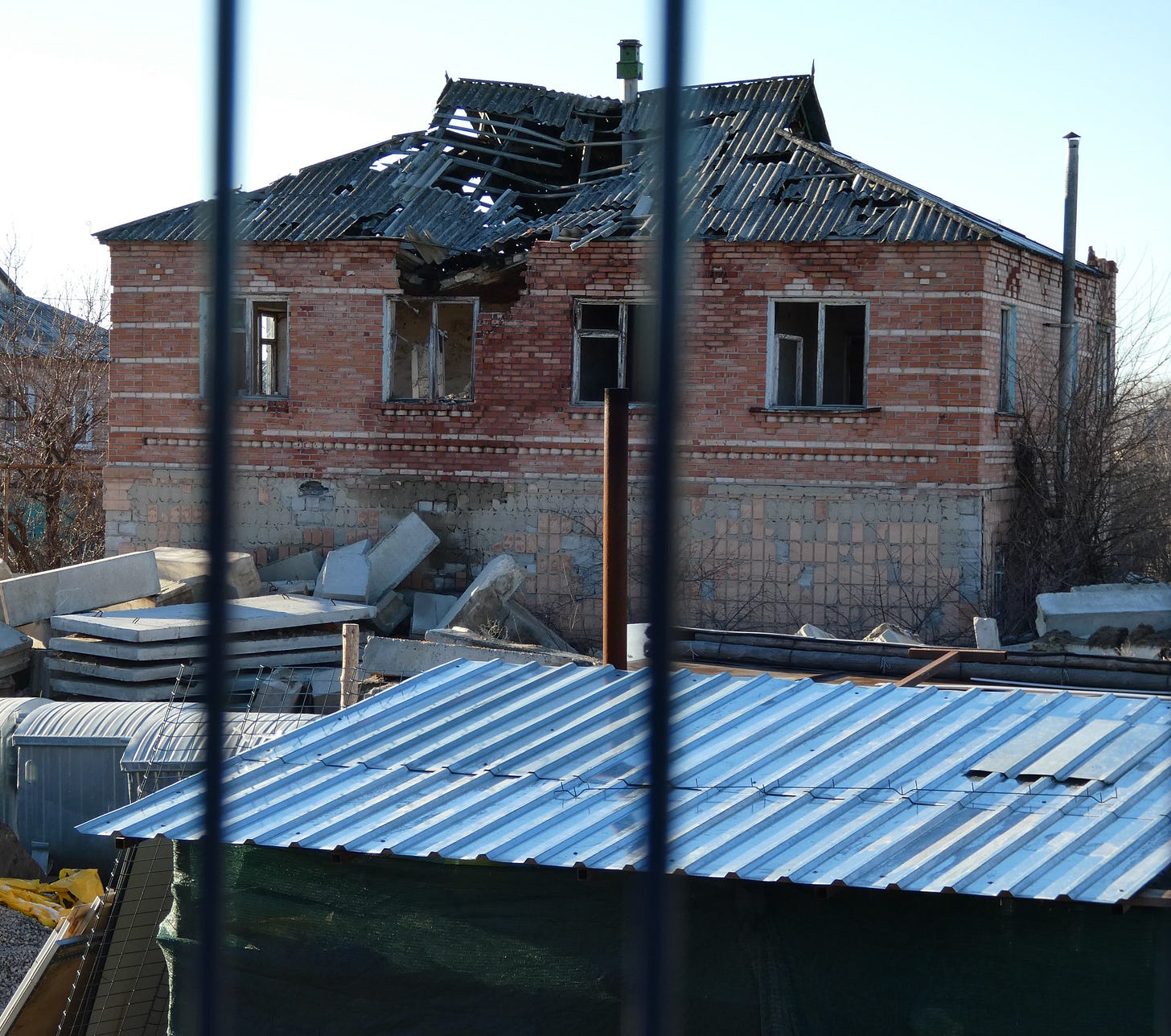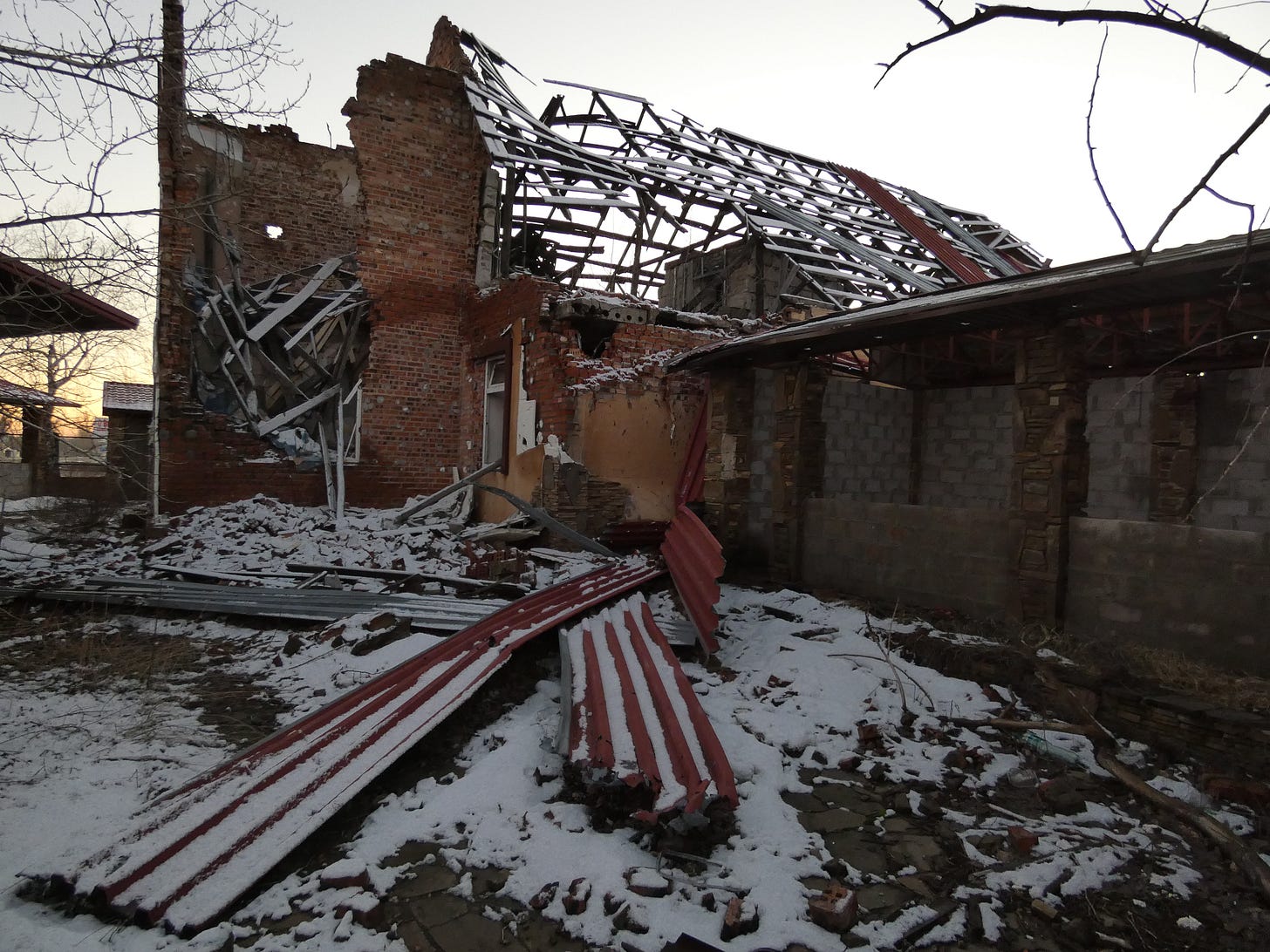Congress dawdles. Russia advances. Ukraine bleeds.
The delay in sending aid — a variation on recent history — imperils Ukraine's future
A destroyed home on the Russian-held side of Stanytsia Luhanska in southeastern Ukraine as seen through a border fence, Feb. 13, 2022. Ukraine installed the fence — located 10 miles inside its true border with Russia — after pro-Russian militants occupied a portion of the Donbas region in 2014. (c. Martin Kuz)
The battered houses on the far side of the border fence attested to past destruction. Peering through the metal bars, I wondered if the bleak scene told of wider devastation to come.
Starting in spring 2014, Russian troops without insignia on their uniforms crossed the border into southeastern Ukraine. The “little green men,” as they were dubbed, supplied the manpower and firepower that enabled pro-Russian militants to seize a large slice of the Donetsk and Luhansk regions, an area known as the Donbas.
Russia’s incursion — like its annexation of Crimea weeks earlier — brought furrowed-brow criticism but little action from Western leaders at the time, including U.S. President Barack Obama and German Chancellor Angela Merkel. The fighting between Russian and Ukrainian forces varied in intensity over the next eight years. Other factors remained constant: the butchery of Vladimir Putin, who viewed cease-fire agreements as figments of the West’s imagination; the timidity of U.S. and European officials, who seemed to believe that a few sanctions would deter the Russian dictator; and the suffering of Ukrainians, who died by the thousands and fled by the hundreds of thousands.
The war in the Donbas killed more than 3,400 civilians and drove 1.6 million people from their homes through early 2022. The conflict forced Ukrainian officials to create artificial boundaries within the country’s sovereign borders to demarcate government-held and Russian-controlled land. Anyone crossing over in either direction needed to pass through checkpoints with metal fences and armed guards.
On a cold, clear February afternoon days before Putin launched his full-scale invasion two years ago, I visited a checkpoint in Stanytsia Luhanska, a de facto border town located 10 miles inside Ukraine. The fence line cleaved the small city in two, and shelling had blown holes in houses since abandoned on either side.
I spoke with several people as they re-entered Ukrainian-held territory. Most had visited elderly parents or other relatives who were too frail, sick, stubborn or sentimental to leave. They now lived in a ruined purgatory of closed shops, scarce goods, high inflation and unbridled crime, and further marred by erratic public services and meager medical care.
“Life there is stuck,” Natalia Simonova told me. A nurse practitioner by training, she had traveled to the city of Luhansk to bring medicine, food and money to her aging mother and father. When fighting erupted in 2014, she escaped to Kyiv with her husband and their two adult sons, pleading in vain with her parents to join them.
A restaurant destroyed by shelling in the town of Stanytsia Luhanska in southeastern Ukraine, Feb. 13, 2022. (c. Martin Kuz)
“It is called a ‘gray zone’ because there is nothing — no energy, no activity, everything destroyed,” Natalia said. She felt grateful for her job in a cosmetics shop in Kyiv but lamented the loss of her old life and worried about her parents. “This is what Putin will do to everyone if there is an invasion.”
The inertness of Western officials during the previous eight years reassured the Russian leader that the United States and Europe would respond only with rhetoric when he sent troops and tanks en masse into Ukraine. He misjudged the galvanizing effects of war. The West’s sudden cohesion — along with the incompetence of Russia’s army and the surprising strength of Ukraine’s — thwarted his ambitions to seize Kyiv.
Two years later, aided by far-right Republicans in Congress, Putin appears ready to collect on his costly, bloody bet that he could wait out the West until its unity frayed. Weeks after the Senate approved $60 billion in additional funding for Ukraine, Speaker Mike Johnson has refused to introduce the legislation in the House. As Congress dawdles, Russia advances and Ukraine bleeds.
I’ll leave the political analysis to experts with a deeper understanding of such matters. The central point is that liberals and conservatives alike in the West’s largest democracies bear blame for Ukraine’s plight.
If Obama and Merkel, among others, had offered more than hollow warnings after Russia first invaded the Donbas, Putin might have holstered his imperialist fantasies. If U.S. President Joe Biden and German Chancellor Olaf Scholz, among others, had moved faster to provide more weapons to Ukraine earlier in the war, there’s reason to think its troops could have regained much of the land Russia still holds.
Each of those leaders identifies as centrist or liberal; Johnson and his closest allies walk under the hard-right banner. In other words, the culpability transcends ideology and party.
But at the moment, as Ukrainian forces run low on ammunition, weapons and morale, it is isolationist Republicans — heeding the cynical, self-interested cue of former President Donald Trump — who imperil Ukraine’s future more than anyone besides Putin himself. Every day that they oppose the funding bill, their chorus of “Ukraine can’t win” inches closer to self-fulfilling prophecy.
The destruction across Ukraine mirrors what once had been confined to the Donbas. The war has killed or wounded hundreds of thousands of civilians and soldiers while displacing more than 10 million people from their homes. Russia occupies almost one-fifth of Ukraine’s territory, controlling hundreds of cities, towns and villages in the south and east.
The list includes Stanytsia Luhanska, where residents now inhabit a ruined purgatory, and where Natalia Simonova warned of a dark future rising from the ashes of the recent past.
Etc.
— Earlier this week I joined CapRadio, the NPR affiliate in Sacramento, Calif., to discuss what lies ahead for Ukraine in the war’s third year. You can listen to the segment here. Scroll down to the second item after clicking the link.
— For those new to Reporting on Ukraine, here’s the link to my recent Q&A with Yaroslav Trofimov, author of the new book “Our Enemies Will Vanish,” a riveting account of the war’s first year. (A couple of outtakes from our interview appeared in last week’s newsletter.)
— A hearty thanks to those of you who have subscribed and spread the word about Reporting on Ukraine. Please help me keep the momentum going by sharing the page on social media and elsewhere. You can also support my self-funded reporting here. Thank you.






Martin Kuz: Thank you for sharing the backstory of the lack of effective assistance over many years that has led to tragic loss of life in Ukraine and what imperils the continued existence of this sovereign democracy.